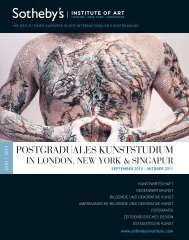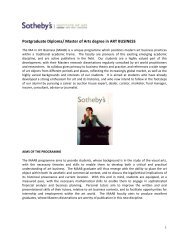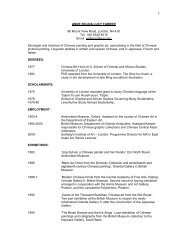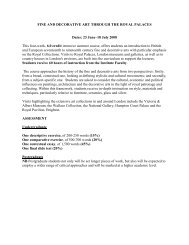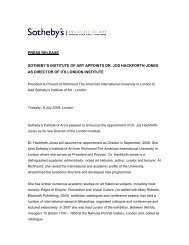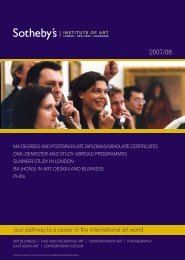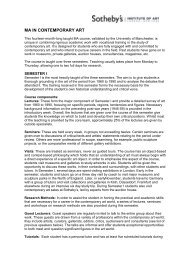Zones of Indistinction: Giorgio Agamben's Bare Life and
Zones of Indistinction: Giorgio Agamben's Bare Life and
Zones of Indistinction: Giorgio Agamben's Bare Life and
You also want an ePaper? Increase the reach of your titles
YUMPU automatically turns print PDFs into web optimized ePapers that Google loves.
CTTE_A_384228.fm Page 122 Sunday, April 26, 2009 1:30 PM<br />
122<br />
Luc Delahaye, <strong>and</strong><br />
Zatorksi <strong>and</strong> Zatorski. See<br />
also, ‘The Conflict <strong>and</strong><br />
Contemporary Visual<br />
Culture in Palestine <strong>and</strong><br />
Israel’, eds Haim Bresheeth<br />
<strong>and</strong> Haifa Hammami,<br />
Third Text, 20:81, 2006.<br />
23 ‘A conversation with Yael<br />
Bartana’, by Galit Eilat, in<br />
Yael Bartana: Videos <strong>and</strong><br />
Photographs, eds Charles<br />
Esche <strong>and</strong> Esra Sarigedik<br />
Öktem, Van Abbemusem,<br />
Eindhoven, n d, pp 35–43,<br />
p 39<br />
24 In a provocative account <strong>of</strong><br />
borders <strong>and</strong> threshold<br />
states <strong>of</strong> being, Jacques<br />
Derrida has outlined three<br />
types <strong>of</strong> border limits:<br />
those associated with<br />
territories <strong>and</strong> states; the<br />
border limits that exist<br />
between domains <strong>of</strong><br />
discourse; <strong>and</strong> the<br />
demarcation between life<br />
<strong>and</strong> death itself. In the<br />
context <strong>of</strong> my discussion, it<br />
is <strong>of</strong> interest that life/death<br />
<strong>and</strong> the possibility <strong>of</strong><br />
passage between two states<br />
<strong>of</strong> being – bearing in mind<br />
the transnational <strong>and</strong><br />
extra-territorial context <strong>of</strong><br />
my argument – should be<br />
somehow equated, not<br />
within their own l<strong>and</strong> (a further blurring <strong>of</strong> the distinction between citizen<br />
<strong>and</strong> refugee). However, this also goes some way to veiling the fact<br />
that Israel is equally under a constant state <strong>of</strong> emergency. In interview,<br />
Bartana has observed that:<br />
Israel is under a state <strong>of</strong> emergency, but it is a social <strong>and</strong> civic state <strong>of</strong><br />
emergency. The government’s emergency policy causes neglect <strong>of</strong> social<br />
problems <strong>and</strong> gaps, pushing the public agenda to the margins. 23<br />
Adrian Paci, Centro di Permanenza Temporanea, (Centre <strong>of</strong> Temporary Permanence), 2007, framed photograph, 105 × 186.5 cm, courtesy <strong>of</strong> Francesca Kaufmann, Milan<br />
It seems there are no winners to be had in a ‘state <strong>of</strong> exception’ <strong>and</strong> these<br />
increasingly ubiquitous threshold spaces that we observe in the no-man’s<br />
l<strong>and</strong> <strong>of</strong> the disputed territories become intersections in time <strong>and</strong> space<br />
that register both the limit <strong>of</strong> justice <strong>and</strong> legality <strong>and</strong> the point <strong>of</strong> its<br />
transgression, that is, injustice <strong>and</strong> illegality. 24<br />
We return here to the effects <strong>of</strong> a ‘state <strong>of</strong> exception’ <strong>and</strong> the reemergence<br />
<strong>of</strong> sovereign power under cover <strong>of</strong> an executive usurpation <strong>of</strong><br />
both national <strong>and</strong> international legislature. Law becomes a law unto<br />
itself <strong>and</strong> yet beyond law too. In the midst <strong>of</strong> such states <strong>of</strong> emergency,<br />
the citizen is strategically confused with homo sacer so as to further<br />
monitor, control, marginalise <strong>and</strong>, if sovereign-ordained power sees fit,<br />
put him/her to death. To our list above we could add the countless political<br />
prisoners languishing in cells the world over, from modern-day<br />
Russia to the emerging superpower that is China. We could also note,<br />
somewhat nearer to home, how the policy <strong>of</strong> internment without trial<br />
initiated in Northern Irel<strong>and</strong> in the 1970s, under the Civil Authorities<br />
(Special Powers) Act, introduced a law giving the authorities the power<br />
to detain suspected terrorists without trial. One <strong>of</strong> the more notable<br />
events to emerge in Northern Irel<strong>and</strong> following on from this period was<br />
the so-called ‘Hunger Strikes’ in 1981 during which ten men starved<br />
Adrian Paci, Centro di Permanenza Temporanea, (Centre <strong>of</strong> Temporary Permanence), 2007, framed photograph,<br />
105 × 186.5 cm, courtesy <strong>of</strong> Francesca Kaufmann, Milan



